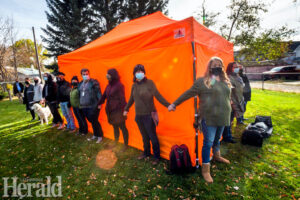Supporters speak out in favour of LOPS
By Lethbridge Herald on October 15, 2020.
 Supporters form a human wall around the side of their pop-up tent after a protestor attempted to dismantle it near the end of a media event held by the Lethbridge Overdose Prevention Society Thursday at London Road Park. Reporters had been invited to the event to hear perspectives from the group and its supporters. Herald photo by Ian Martens
@IMartensHerald
Supporters form a human wall around the side of their pop-up tent after a protestor attempted to dismantle it near the end of a media event held by the Lethbridge Overdose Prevention Society Thursday at London Road Park. Reporters had been invited to the event to hear perspectives from the group and its supporters. Herald photo by Ian Martens
@IMartensHeraldDale Woodard
Lethbridge Herald
A media gathering for the Lethbridge Overdose Prevention Society was once again met with opposition Thursday afternoon.
In their ongoing battle with Lethbridge’s opioid crisis, the LOPS held an event Thursday at London Road Park featuring a variety of speakers and members of the medical field to speak on behalf of their cause.
But as has been the case since the LOPS started at the end of last month in response to the province stopping funding for ARCHES, protesters arrived late in the gathering to make their thoughts of the LOPS known.
The Lethbridge Police Service attended the scene and the tent was taken down.
But before the protests, the afternoon event featured guest speakers touching on subjects such as homelessness and discrimination to the Indigenous population.
Also read out was a letter written in response to Associate Minister Jason Luan’s recent “Open Letter to Lethbridge,” which ran in the Sept. 29 issue of The Herald.
“I think it’s very important to show just how many people of all walks of life are supportive of this, not only in Lethbridge, but province-wide and nationally as well. It just happens that rate of mortality from opioid poisoning in Lethbridge is higher than anywhere else in the country right now, the need is the greatest,” said Dr. Bonnie Larson, a physician and family doctor from Calgary who works closely with the Mobile Integrated Health Program for Community Paramedics. “It comes down to my patients, that’s my priority. I’m not an activist, none of us are. None of the doctors here who are supportive of this are necessarily radical activists. We’re here because we care about our patients and we have an oath as physicians to make sure they don’t die and our patients are dying.
“This is really necessary because our systems are not taking care of people enough and they’re not preventing folks from dying of opioid poisoning. So we’re here because we care about our patients.”
Still, Sarah Villebrun was incensed to see the orange tent set up in her neighbourhood in broad daylight.
“I was notified the tent was up at approximately 2:55 p.m.. One of the neighbours in this area sent a video recording and said the tent was up and can somebody do something about it. I said I was 100 per cent on my way,” said Villebrun, who has been a mainstay at other LOPS protests over the past three weeks. “Today I’m extremely frustrated because it’s broad daylight. It’s a few minutes prior to my kids arriving at this location to get off the bus from school. Quite frankly, no children need to see a consumption site. There’s a reason the previous locations were placed in spots where children would not be affected. Our current supervised consumption site is placed in the location where children will not be directly affected by this.”
But Tim Slaney, a former ARCHES employee and organizer with the LOPS, said Thursday’s event was about demonstrating the support his group has received.
“I think the important thing is to demonstrate to the city and to the province that there is a lot of support on our mission among members of the health-care community and members of the Indigenous community, the people who are really on the front lines and seeing just how bad the problem in Lethbridge is.”
Despite the opposition, the LOPS has pushed forward.
“We were bracing for the worst and I think we found people are undeterred,” said Slaney. “They still want to come out there every night. Sometimes our biggest problem is too many people who are willing to come out, so we’re happy that way. We’ve found other ways to respond to some of the problems in Lethbridge. We’ve made a lot of good headway handing out Naloxone kits.”
While camps have formed on the city’s opioid crisis, Larson said she doesn’t see it from that perspective.
“I don’t see it as both sides,” she said. “I think the polarization of this issue is artificial and constructed for political gain. Today demonstrates, to some extent, that people really care about this issue and don’t want to see people dying from opioid overdoses anymore. I think people really want to help and find solutions.
“There are some stumbling blocks to that and some real bottlenecks with this very complex issue. It’s going to require a complex, collaborative solution and a number of different solutions; there isn’t just one thing that’s going to solve it. Levels of government must work together and I think what we’re seeing is there are many parts of the whole government system that are pointed in the right direction, but there are some and the ones that have the most power, that are not supportive of making sure people live or die.”
Follow @DWoodardHerald on Twitter
-1




